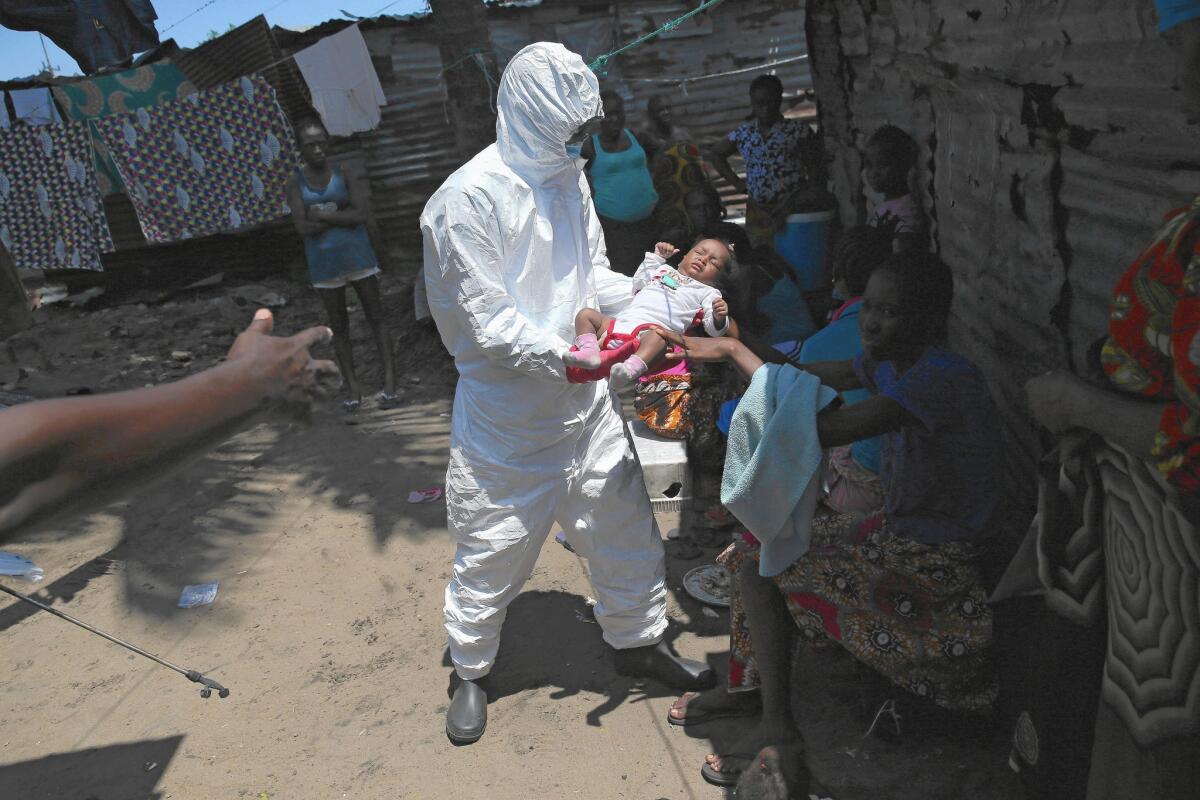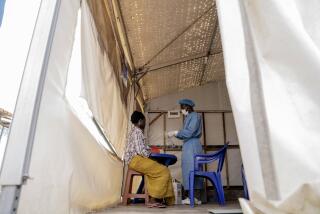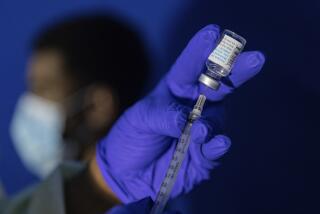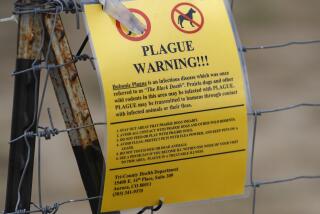Year in Review: Efforts to stop Ebola are gaining ground, but the fight isnât won

The plague erupted deep in the forests of West Africa, sweeping through isolated villages and teeming cities before reaching across oceans to Europe and the United States.
Previous Ebola outbreaks have felled hundreds of people. But health officials report that this yearâs epidemic has already sickened nearly 20,000 and killed about 7,700 of them, more than all other known occurrences combined.
As 2015 approaches, there is reason to hope that what at first was a plodding international response is finally catching up with the virus. In Liberia, where just a few months ago bodies were left in the streets for days and patients were turned away from treatment facilities because there werenât enough beds or personnel, the number of cases has been dropping rapidly. There are also signs that the disease may be slowing in Sierra Leone, which has overtaken Liberia as the country with the biggest caseload.
Dr. Thomas Frieden, director of the U.S. Centers for Disease Control and Prevention, told reporters Monday that he was hopeful about stopping the epidemic but cautioned, âThis is going to be a long, hard fight.â
In the hardest-hit countries, the effects of the outbreak could be felt for years. Healthcare systems have collapsed, schools closed, fields left untended and commerce curtailed. The virus has ripped through families, leaving thousands of orphans, many of whom are stigmatized.
The vast majority of the casualties have been in three West African nations: Liberia, Sierra Leone and Guinea. But the hysteria caused by one of the worldâs most frightening diseases has outpaced the threat.
American tourists canceled holidays in Kenya and South Africa, countries untouched by the virus. New Jersey and Maine sought to quarantine a nurse who returned after treating Ebola patients in Sierra Leone, even though she had no symptoms. The dog of an infected healthcare worker in Spain was euthanized by authorities who were worried that it, too, might come down with the disease.
Although just four people fell ill in the United States, two of whom had been infected in Africa, it quickly became apparent that many hospitals werenât as prepared for Ebola patients as the public had been led to believe. But a massive public health effort prevented further spread. Nigeria, Senegal and Spain also appear to have the virus contained, and Mali hasnât reported a new case in weeks.
The Ebola epidemic began in a remote village in Guinea in December 2013, when a 2-year-old boy developed a mysterious illness and died. Other family members and a guest also fell ill, and soon the contagion was spreading to other communities.
Many health officials had never seen an Ebola outbreak and mistook the disease for more common ailments such as malaria or cholera. To make matters worse, it struck in an area where the borders of three nations converge, amid a deeply impoverished yet highly mobile population. By the time the virus was identified in March, it had reached Guineaâs bustling capital, Conakry, and there were suspected cases in Liberia and Sierra Leone.
The regionâs ramshackle health facilities, devastated by warfare and chronic poverty, werenât equipped for a major epidemic, and international health officials were slow to recognize the danger. The World Health Organization did not declare an international public health emergency until August. By then the virus was racing through the Liberian capital, Monrovia, a city of more than 1.3 million, and had reached Nigeria, Africaâs most-populous nation.
The following month, President Obama announced that the U.S. would send medical supplies and thousands of military personnel to West Africa to help fight a contagion that posed âa potential threat to global security.â
Britain, France, China and other countries also offered help. But it would take months to build essential treatment centers, establish labs and train personnel. Teams also had to be set up to trace those who had come into contact with the virus, instruct people on how to protect themselves and safely bury the dead.
Frieden acknowledged this week that scaling up the response in Africa was âstill a work in progress.â
âIt is encouraging to see that when we get to a place where Ebola is spreading quickly, we can end that cluster within a month or two,â he said. âBut the problem is, there are clusters all over, and new ones popping up all the time.â
Many of the flare-ups are in isolated communities far from medical facilities or cellphone coverage and in some cases deeply hostile to the strangers who arrive in what look like moon suits to take their loved ones away.
Members of the Los Angeles-based International Medical Corps helped respond to one such outbreak in Grand Bassa County, in central Liberia.
At the time, there were no centers equipped to treat Ebola patients there, said Dr. Pranav Shetty, the groupâs emergency health coordinator. Those suspected of having the virus would have to be taken to IMC units in two neighboring counties, a two-hour trek on foot through thick rain forest, over hills and across rickety bamboo bridges to reach a dirt road, then two more hours by ambulance.
It was impossible to carry patients that distance, so Doctors Without Borders took in tents to isolate those too sick to walk and prevent further spread of the virus.
âUnless we stamp out every last instance of this disease, itâs never going to go away,â Shetty said.
Although the tactics being used have stemmed smaller Ebola outbreaks, some experts are beginning to question whether this one has spread too far to be fully contained without a vaccine or cure.
Stephen S. Morse, a professor of epidemiology at Columbia Universityâs Mailman School of Public Health, said it has been encouraging to see new resources devoted to identifying better ways to fight Ebola.
The loss of life has been devastating in parts of West Africa, he said, but the survival rate has been higher in the U.S. Only two of at least 10 patients treated in the U.S. have died.
âEbola for the first time is a manageable disease,â Morse said. âOnce we have real treatments for it, it will become much different.â
Heading into 2015, U.N. Secretary-General Ban Ki-moon is urging world leaders to learn lessons from the deadly epidemic, ones that go beyond strengthening public health systems.
âThe international community needs better early warning and rapid responseâ mechanisms to stay ahead of the next disease outbreak, he told reporters in New York on Monday, âa test that is sure to come.â
More to Read
Sign up for Essential California
The most important California stories and recommendations in your inbox every morning.
You may occasionally receive promotional content from the Los Angeles Times.











